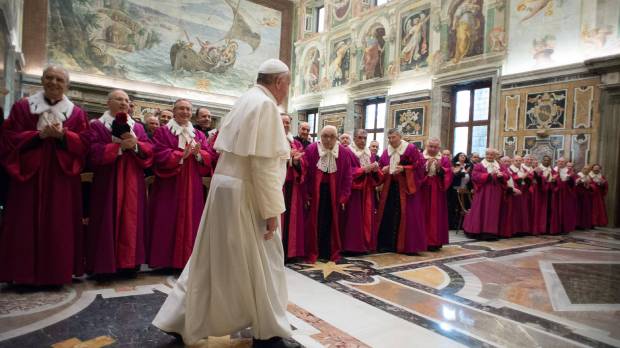Faced with the “predominant culture of the ephemeral and provisional” that weighs on Catholic marriage, Pope Francis proposes for young couples a catechumenate “as effective as possible” before and after the celebration marriage — the first to prepare them for the sacrament, the second to accompany and support them “spiritually” in their common life, especially in view of the Christian education they will have to give to their children. “Too many sacramental marriages are null and inconsistent, it must be remedied,” said Pope Francis as he received the judges and lawyers of the Tribunal of the Roman Rota, on the occasion of their new judicial year. “You need to identify, with courage and creativity, a training project for young married couples, with initiatives aimed at increasing awareness of the sacrament received,”
“Young spouses must feel that the Church loves them and is close to them!”
A great opportunity for evangelization
“Some couples are actively involved in parish life, others come for the first time; some have intense prayer lives while others have a more general, less precise religious feeling,” the pope said in his speech. Preparing all of these couples is “a true opportunity for evangelization,” which allows young adults to “renew their faith” and to “rediscover marriage and family, according to God’s plans.”
In June 2016, the Sovereign Pontiff made a severe diagnosis of the unions celebrated by the Catholic Church, deploring the “invalidity” or “inconsistency” of a great many of them. “Null because the couple say yes for life, without knowing what they say, because they have a different culture,” he explained. “They have goodwill but are not aware of the sacrament.”
A continuous formation, before and after
Preparation for the sacrament of marriage takes time and reinforcement, said the pope. Similarly to priestly or religious vocations, marriage demands “a continual integration in the Church and with the Church,” he reaffirmed before the judges and lawyers of the Roman Rota. In a world dominated by the provisional and ephemeral culture, the Holy Father recognizes the need for “courage” today for young people to embark on marriage. And this is why he proposes these two remedies: to put in place an effective preparation “not only for human development, but for the growth of the faith of the betrothed” and then offer a “new catechumenate” — continuing formation which allows the couple and the parish to maintain a constant relationship.
The pope expressed regret that young people “left to their own devices” after their marriage often disappear from parish life, especially “after the birth of children.” This is precisely the moment, he said, when they would need “spiritual support.” Suggesting to the parishes the establishment of “support groups” to follow up with young couples.
Catholic Religious Education: “I look at my students and see our future ex-Catholics!”
For the difficult times
The two fundamental teachings that can prevent “the proliferation of invalid or incoherent matrimonial celebrations,” says the pope, hopefully, are to teach young couples to “go beyond the ephemeral moment” and “to remain firmly attached to a common path.” Love, in order to last, “must be based on truth,” and so it is essential that this relationship between “love and truth” is widely explained and developed with brides and grooms before their marriage.
On 14 February 2014, on the occasion of Valentine’s Day, patron saint of lovers, the pope told a gathering of more than 25,000 engaged couples visiting St. Peter’s Square, “It is not enough that a marriage lasts to say that it is successful. What is important is its quality: being together and knowing how to love one another forever represents the challenge of Christian spouses,” he said, explaining to young couples that “love is a relationship, a reality that grows … like the construction of a house.”
In closing his remarks to Tribunal, the pontiff said, “Dear brothers, as I’ve said several times, great courage is needed to get married in the times we live in, and those who have the strength and the joy of taking this important step must feel next to them the concrete affection and closeness of the Church.”

